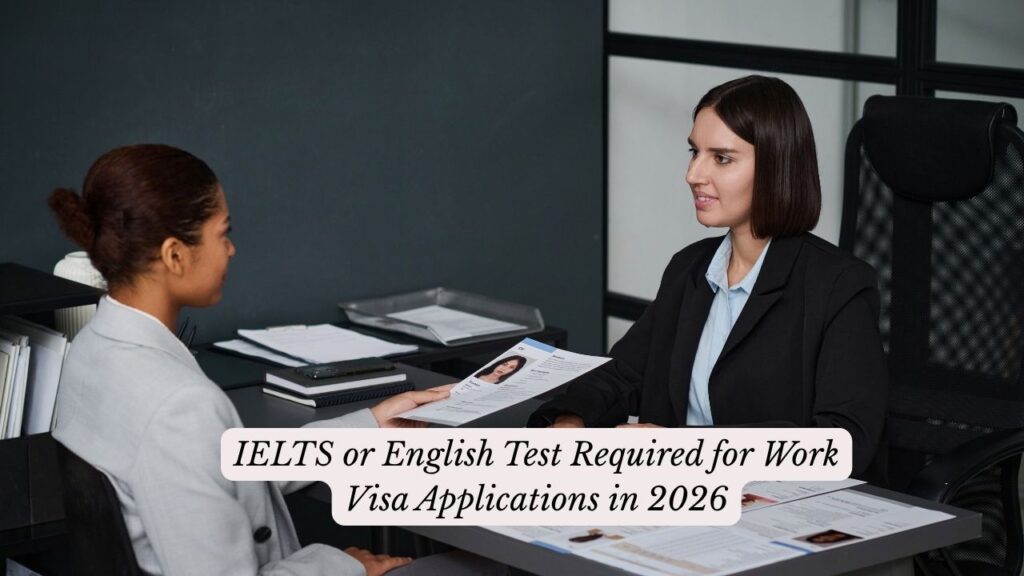Dreaming of a career abroad in 2026? Whether you’re eyeing the bustling cities of the UK, the vast landscapes of Canada, or the sunny shores of Australia, understanding the English language requirements for work visa applications is a critical first step. It’s a common hurdle, but one that can be successfully overcome with the right preparation and knowledge. As someone who has advised countless individuals on their international career journeys, I’ve seen firsthand how clarity on these requirements can make all the difference between a smooth application and unnecessary delays. This article will provide comprehensive, actionable, and encouraging information to help you successfully navigate the English language proficiency requirements for work visas in 2026.

Securing a work visa often hinges on demonstrating your ability to communicate effectively in English, especially if you’re moving to an English-speaking country. This typically means taking a recognized English language proficiency test, with the International English Language Testing System (IELTS) being one of the most widely accepted. While the specific requirements can vary by country and even by visa category, a strong grasp of English will always be an asset, enhancing your professional prospects and easing your integration into a new society.
Why English Proficiency Matters for Your Work Visa
Beyond fulfilling a visa requirement, demonstrating English proficiency is crucial for several practical reasons. For employers, it’s a testament to your ability to collaborate, understand instructions, and contribute effectively to a team. For you, it means a smoother transition into a new work environment, better networking opportunities, and a richer cultural experience. Many countries use the Common European Framework of Reference for Languages (CEFR) to define the required English level, with tests like IELTS aligning their scores to these standards.
The United Kingdom: A Demand for Clarity and Specificity
The UK’s immigration system is precise about its English language requirements, particularly for Skilled Worker Visas. For most work visa categories, you will need to demonstrate at least a B1 level on the CEFR scale. This often translates to an IELTS for UKVI General Training score of at least 4.0 in all four components: reading, writing, listening, and speaking.

In my experience advising individuals seeking UK work visas, one common hurdle is confusing the standard IELTS with the IELTS for UKVI. Always double-check which specific test is needed for your visa category on the official UK government website to avoid any last-minute surprises. Recent updates also suggest stricter English language rules are being implemented, with partners of work visa holders potentially needing to prove basic English by the end of 2025.
UK English Language Requirements (Skilled Worker Visa)
| Key Fact | Detail/Statistic |
| Required CEFR Level | B1 (for most Skilled Worker visas) British Council Malaysia – IELTS tests for UK Visas and Immigration |
| IELTS for UKVI Score | Minimum 4.0 in each of the four components (Listening, Reading, Writing, Speaking) |
| Accepted Tests | IELTS for UKVI (General Training), Pearson PTE Academic (UKVI), LanguageCert International ESOL (UKVI), Trinity College London Integrated Skills ISE (in UK only) |
| Exemptions | Nationals of majority English-speaking countries (e.g., USA, Australia, Canada, New Zealand), or those with a degree taught in English from a recognized institution. University of Bath – Skilled Worker visa: English language requirements |
Canada: CLB Levels and Approved Tests
For Canada, language proficiency is a cornerstone of its immigration system, especially for economic immigration programs like Express Entry (which includes the Federal Skilled Worker Program, Federal Skilled Trades Program, and Canadian Experience Class). Canada uses the Canadian Language Benchmarks (CLB) to assess English (and French) proficiency.
The IELTS General Training test is the most common English language test accepted by Immigration, Refugees and Citizenship Canada (IRCC). Other accepted tests include the CELPIP (Canadian English Language Proficiency Index Program) General Test and the Pearson Test of English (PTE) Core. The minimum CLB level required varies depending on the specific program and job, but generally, a CLB 7 is a good target for Federal Skilled Worker Program applicants, which translates to an IELTS General Training score of 6.0 in each of the four abilities.
Canada emphasizes an applicant’s ability to integrate and contribute, and robust language skills are seen as essential for success in the Canadian workforce and society.
- IELTS General Training: This is the preferred test for Canadian immigration purposes. The IELTS Academic test is for those applying to study.
- CELPIP General Test: Another popular option, particularly for those already in Canada or familiar with Canadian English.
- PTE Core: Pearson Test of English Core is also an accepted option.
Australia: Diverse Visas, Varied Requirements
Australia’s work visa landscape is diverse, and so are its English language requirements. The Department of Home Affairs (DHA) accepts several English proficiency tests, including IELTS Academic and One Skill Retake, TOEFL iBT, and Pearson Test of English (PTE) Academic.
The specific score needed will depend heavily on the visa subclass you are applying for and your occupation. For instance, a skilled migration visa might require “Competent English,” which often means an IELTS score of 6.0 in each of the four components, or equivalent scores on other accepted tests. Higher levels, such as “Proficient English” or “Superior English,” may be required for certain professions or to gain additional points in the skilled migration points test.

Alternatives to IELTS and Exemptions
While IELTS is a prominent name, it’s certainly not the only option. Many countries accept a range of Secure English Language Tests (SELTs) for work visa applications. These often include:
- TOEFL iBT (Test of English as a Foreign Language – Internet-Based Test): Widely accepted across many countries, including the US, Canada, Australia, and the UK.
- PTE Academic (Pearson Test of English Academic): Gaining popularity due to its computer-based format and fast results.
- Cambridge English Qualifications (e.g., C1 Advanced, C2 Proficiency): Recognized by many institutions and immigration bodies globally.
- Duolingo English Test (DET): Some countries and institutions are increasingly accepting the DET, particularly for certain visa types or educational pathways, though its acceptance for work visas can be more limited than IELTS or TOEFL.
Navigating Germany Visa Rejection: Your Updated Appeal Policy Guide (July 2025)
FAQ
Q1: Do all countries require an English test for work visas?
A1: No, not all countries require an English test for work visas. Requirements vary significantly by country, the type of visa, and sometimes even the specific occupation. Many English-speaking countries generally do, but even then, there are often exemptions for citizens of other English-speaking nations or those who have completed higher education in English. Always check the official immigration website of your target country.
Q2: Can I use an online English test for my work visa application?
A2: While some online English tests like the Duolingo English Test are gaining acceptance for certain purposes (e.g., some university admissions), their acceptance for work visa applications can be more limited compared to traditional in-person tests like IELTS or TOEFL. Countries like the UK generally require Secure English Language Tests (SELTs) taken in person at approved centers for work visas. Always verify with the specific immigration authority.
Q3: How long are English test results valid for work visa applications?
A3: Most English language test results, including IELTS and TOEFL, are typically valid for two years from the test date. It’s crucial to ensure your results will be valid throughout the entire visa application process, especially for visas that might have longer processing times.
Q4: What if I don’t meet the minimum English language requirement?
A4: If you don’t meet the minimum English language requirement, your work visa application will likely be refused. Your options are to retake the test to achieve the required score, explore alternative visa pathways that might have different requirements, or if applicable, seek an exemption. It’s best to prepare thoroughly before taking the test to maximize your chances of success.










